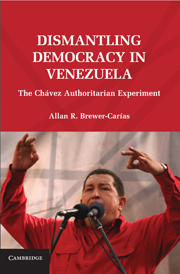Book contents
- Frontmatter
- Contents
- AUTHOR'S NOTE
- INTRODUCTION DEFRAUDING DEMOCRACY THROUGH NONCONSENSUAL CONSTITUENT ASSEMBLIES
- PART ONE THE POLITICAL ASSAULT ON STATE POWERS AND THE FRAMEWORK FOR AUTHORITARIANISM
- PART TWO INSTITUTIONAL DEVELOPMENT TOWARD CONSOLIDATING AUTHORITARIANISM
- PART THREE CONSTITUTIONAL REFORMS DESIGNED TO CONSOLIDATE AUTHORITARIANISM
- Chapter 10 THE FAILED ATTEMPT TO CONSOLIDATE AN AUTHORITARIAN AND ANTIDEMOCRATIC POLITICAL SYSTEM IN THE CONSTITUTION
- Chapter 11 THE FAILED ATTEMPT TO CONSOLIDATE A CENTRALIZED STATE IN THE CONSTITUTION
- Chapter 12 THE FAILED ATTEMPT TO CONSOLIDATE A SOCIALIST CENTRALIZED ECONOMIC SYSTEM IN THE CONSTITUTION
- Chapter 13 THE IRREGULAR FRAUDULENT IMPLEMENTATION OF THE REJECTED CONSTITUTIONAL REFORM THROUGH LEGISLATION
- Chapter 14 THE ILLEGITIMATE MUTATION OF THE CONSTITUTION THROUGH JUDICIAL CONSTITUTIONAL INTERPRETATION
- Chapter 15 THE ALTERNATE PRINCIPLE OF GOVERNMENT AND THE 2009 CONSTITUTIONAL AMENDMENT ON CONTINUOUS REELECTION
- FINAL REFLECTIONS: THE RIGHT TO DEMOCRACY AND ITS VIOLATION BY VENEZUELA'S AUTHORITARIAN GOVERNMENT: SOME RELEVANT FACTS FROM THE PAST DECADE
- INDEX
FINAL REFLECTIONS: THE RIGHT TO DEMOCRACY AND ITS VIOLATION BY VENEZUELA'S AUTHORITARIAN GOVERNMENT: SOME RELEVANT FACTS FROM THE PAST DECADE
Published online by Cambridge University Press: 05 June 2012
- Frontmatter
- Contents
- AUTHOR'S NOTE
- INTRODUCTION DEFRAUDING DEMOCRACY THROUGH NONCONSENSUAL CONSTITUENT ASSEMBLIES
- PART ONE THE POLITICAL ASSAULT ON STATE POWERS AND THE FRAMEWORK FOR AUTHORITARIANISM
- PART TWO INSTITUTIONAL DEVELOPMENT TOWARD CONSOLIDATING AUTHORITARIANISM
- PART THREE CONSTITUTIONAL REFORMS DESIGNED TO CONSOLIDATE AUTHORITARIANISM
- Chapter 10 THE FAILED ATTEMPT TO CONSOLIDATE AN AUTHORITARIAN AND ANTIDEMOCRATIC POLITICAL SYSTEM IN THE CONSTITUTION
- Chapter 11 THE FAILED ATTEMPT TO CONSOLIDATE A CENTRALIZED STATE IN THE CONSTITUTION
- Chapter 12 THE FAILED ATTEMPT TO CONSOLIDATE A SOCIALIST CENTRALIZED ECONOMIC SYSTEM IN THE CONSTITUTION
- Chapter 13 THE IRREGULAR FRAUDULENT IMPLEMENTATION OF THE REJECTED CONSTITUTIONAL REFORM THROUGH LEGISLATION
- Chapter 14 THE ILLEGITIMATE MUTATION OF THE CONSTITUTION THROUGH JUDICIAL CONSTITUTIONAL INTERPRETATION
- Chapter 15 THE ALTERNATE PRINCIPLE OF GOVERNMENT AND THE 2009 CONSTITUTIONAL AMENDMENT ON CONTINUOUS REELECTION
- FINAL REFLECTIONS: THE RIGHT TO DEMOCRACY AND ITS VIOLATION BY VENEZUELA'S AUTHORITARIAN GOVERNMENT: SOME RELEVANT FACTS FROM THE PAST DECADE
- INDEX
Summary
REPRESENTATIVE DEMOCRACY AND THE VENEZUELAN AUTHORITARIAN GOVERNMENT
The Inter-American Democratic Charter of September 11, 2001, recognized democracy as a right of the peoples of the Americas, with the consequent obligations of Latin American governments to promote and defend it as essential to their social, political, and economic development. Democracy, in this context, is indispensable to the effective exercise of fundamental freedoms and human rights in their universality, indivisibility, and interdependence, embodied in the national constitutions and in international human rights instruments (Article 7).
The charter considered the effective exercise of representative democracy as the basis for the rule of law, enumerating its essential elements as follows: respect for human rights and fundamental freedoms; access to and the exercise of power in accordance with the rule of law; the holding of periodic, free, and fair elections based on secret balloting and universal suffrage as an expression of the sovereignty of the people; a pluralistic system of political parties and organizations; and separation of powers and independence of the branches of government (Article 3). In addition, Article 4 of the charter enumerated the following essential components of the exercise of democracy: transparency in government activities, probity and responsible public administration, respect for social rights, and freedom of expression and of the press (Article 4). Furthermore, the charter considered equally essential to democracy the constitutional subordination of all state institutions to the legally constituted civilian authority and respect for the rule of law on the part of all institutions and sectors of society.
- Type
- Chapter
- Information
- Dismantling Democracy in VenezuelaThe Chávez Authoritarian Experiment, pp. 367 - 412Publisher: Cambridge University PressPrint publication year: 2010



